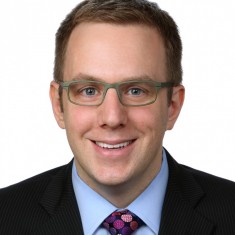Kristopher Fador

Class Year:
2004
Job Title:
Senior Vice President, Bank of America Merrill Lynch
Areas of Study:
History, Economics
When you arrived at Lake Forest College, did you know you wanted to major in history?
When I arrived at Lake Forest in August 2000 I was not entirely sure what I wanted to major in. I knew I really enjoyed history and wanted to take several History courses but I was also concerned about a career after college and was apprehensive a history degree alone would make it more challenging, unless of course I wanted to stay in academia.
If you did not originally intend to major in history, what changed your mind?
After a few courses and several meetings with my advisor, I decided that I wanted to pursue dual majors in Economics and History. I felt that the two degrees had several intersections and I was passionate about both subject areas.
What was your area of focus in history?
I focused primarily on studying World War 2.
Was there a particular piece of work that you remember as especially rewarding or challenging?
I was lucky to have several professors while at Lake Forest who really pushed me as an individual to explore the world through history. It is a large part of the reason why, upon graduating, I wanted a job that would allow me to travel and see the things I learned about in the classroom and studies.
Just this year my wife and I visited the mountains in Thailand to view the “Thai Burma Death Railway” that was constructed during World War 2. It was a fascinating experience to be able to physically see and walk along the same places I had only before read about.
Professor Carol Gayle really encouraged me to further explore the synergies between History and Economics. With her assistance and that of Professor Kent Grote from the Economics department, I decided to write a senior thesis drawing on what I learned from both majors. I wrote about the economic impact of strategic bombing in the European theatre of World War 2. Writing this thesis was quite a challenge for me, but helped me improve my writing, research, and most importantly critical thinking. Ten years later it is something I am still very proud of.
How did your history major prepare you for advanced studies?
I was lucky enough to attend the Bank of America Technology Executive Leadership Program at the University of Virginia – Darden Graduate School of Business. During my brief time at Darden we spent several sessions on root cause analysis for problem solving, a skill this is critical for any business leader. During the class it was obvious to me that the critical thinking we focused on at Lake Forest College was a foundation for so much of what I do now in my career.
Many of our students worry that traditional liberal arts majors (particularly in the humanities) will not translate to job skills. Share your advice.
As a senior leader at one of the world’s largest financial institutions, when I am recruiting talent I am looking for leaders and critical thinkers. I work in information security, a field that is constantly evolving and changing so it is more important than ever that we attract individuals who are agile learners and problem solvers.
It is not enough to be an expert in a technical subject matter; large corporations and small startups alike need individuals that can go beyond deep technical expertise and can apply knowledge across multiple and diverse disciplines. The wave of the future will continue to be innovation, and the corner stone of innovation is critical thinking. A liberal arts college first and foremost teaches critical thinking.
How do the skills and knowledge you acquired in your history major inform your day-to-day work?
I am currently based in Hong Kong and am responsible for managing an information security program across twelve countries with a workforce that is both culturally and geographically diverse. In my current role, having studied history has helped me understand the geo-political environment in Asia, which has a direct impact on how I approach both leading my team and aligning our program across the firm.

